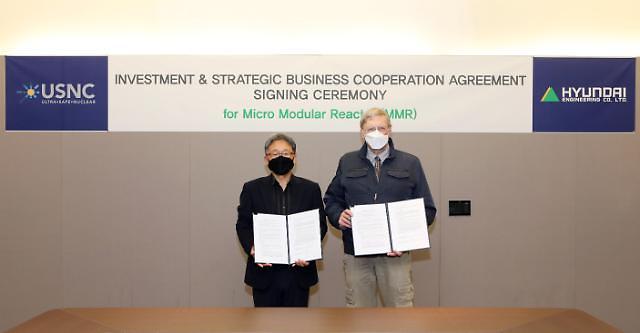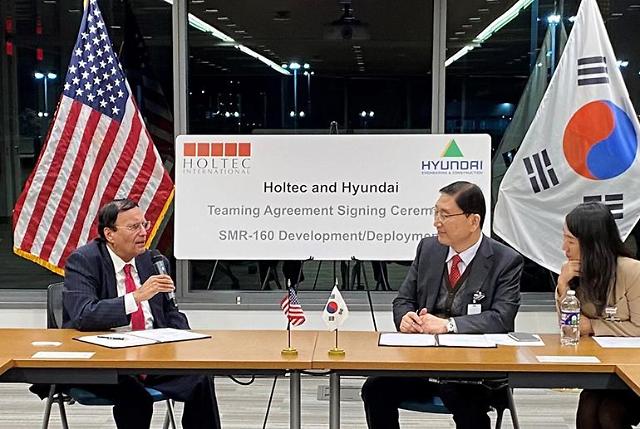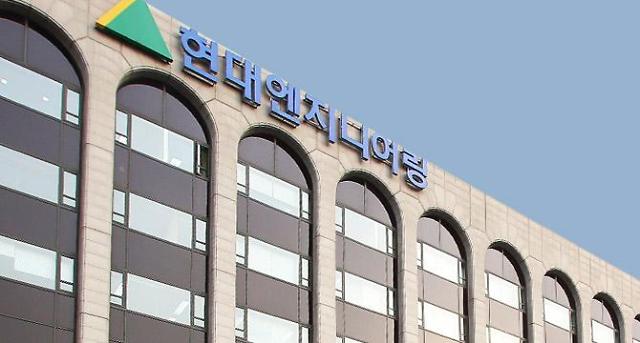
[Courtesy of Hyundai Engineering ]
Hyundai Engineering (HEC) said it has signed an investment and business cooperation agreement with Ultra Safe Nuclear Corporation (USNC). "With this investment, we have secured an exclusive position in USNC's global EPC business in the field of microreactors, a next-generation energy source," an unnamed HEC official said in a statement on January 11. "From now on, we will preoccupy the global small modular reactor (SMR) power plant market."
SMRs, which have been studied to address the limitations of traditional light-water reactors, allow for less on-site construction, increased containment efficiency, and enhanced safety. USNC's electrical high-temperature gas-cooled micro modular reactor is a fourth-generation nuclear energy system that delivers heat and power to remote mines, industry, and communities
USNC and HEC, together with the state-run Korea Atomic Energy Research Institute, have carried out basic design under an agreement to develop HTGR technologies and investigate applications in South Korea. The HTGR system, which uses a graphite moderator with a once-through uranium fuel cycle, can conceptually have an outlet temperature of 750 degrees Celsius that enables applications such as process heat or hydrogen production via the thermochemical sulfur–iodine cycle.
In Ontario, Canada, USNC’s 5-MWe microreactor has been selected for an SMR project at the Chalk River Laboratories in Ontario, Canada. USNC’s energy system consists of the nuclear plant that generates heat and the adjacent power plant that converts heat into electricity or provides process heat for industrial applications. It is designed to be simple, with minimal operations and maintenance requirements, and no on-site fuel storage, handling, or processing.
Separately, a South Korean team led by HEC signed an agreement with Canadian teams In December 2021 to build a 100 megawatt electrical (MWe) small modular reactor in Alberta, a province in Western Canada, using sodium-cooled fast reactor technology. HEC is in charge of EPC, while KAERI will develop a sodium-cooled fast reactor (SFR) for long cycle power generation. SFR is a fast neutron reactor cooled by liquid sodium. Sodium's chemical reactivity requires special precautions to prevent and suppress fires. If sodium comes into contact with water it reacts to produce sodium hydroxide and hydrogen, and the hydrogen burns in contact with air.
South Korea has adopted a new energy policy to accelerate the development of advanced SMRs. Scientists are trying to design concepts for a cost-effective micro modular reactor (MMR) that could be used for about 40 years without changing fuel by addressing the limitations of traditional light-water reactors.
In November 2021, Hyundai E&C, a builder affiliated with South Korea's Hyundai auto group, jumped into the small modular reactor market in cooperation with Holtec International, a U.S. company specializing in the design and manufacture of parts for nuclear reactors. Holtec's SMR-160 is a pressurized water reactor with a capacity of 160 MWe that does not rely on any pumps or motors to remove heat from the nuclear fuel.
In an effort to acquire diverse SMR technologies, KAERI has partnered with Samsung Heavy Industries to develop a small carbon-free fission reactor based on molten salt that would be used for ships and floating nuclear power plants. Molten salt reactors (MSRs) can reduce expensive containment structures, eliminate hydrogen as a source of explosion risks, and do not produce radioactive fission gases.
Copyright ⓒ Aju Press All rights reserved.


![[FOCUS] Environmental activists oppose development of advanced small modular reactors](https://image.ajunews.com/content/image/2021/06/18/20210618093752767200.jpg)

View more comments